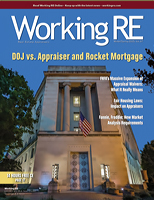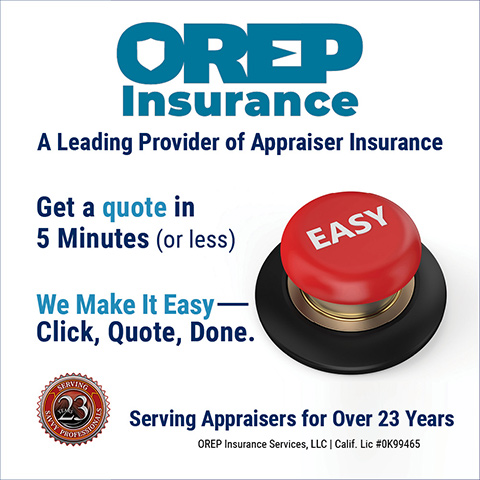 |
> TrueTracts > AMC Resource Guide > OREP E&O |
Appraiser Growth and Profitability: Key Things to Focus On
by Isaac Peck, Publisher
The last few years have been extremely difficult for the majority of appraisers. Historically low transaction volume has translated into an unprecedented slowdown that has led some appraisers into retirement and others to take on a second job.
Appraisers who have been around for a few market cycles know that the ebb and flow of a market is normal, but that’s little consolation to the pain in the marketplace right now.
For those appraisers who have survived the slowdown thus far and are looking ahead—to 2025 and beyond—and are earnestly asking how they can maintain, diversify and even grow their businesses, Working RE sat down with Dustin Harris, The Appraiser Coach, to discuss exactly that.
Harris has been appraising real estate for almost 30 years. A popular author, speaker, and consultant, in addition to his success as an independent appraiser, Harris owns and operates The Appraiser Coach (www.TheAppraiserCoach.com), where he serves as a mentor to other appraisers, helping them run successful appraisal companies and increase their net worth. His blog is read by over 20,000 appraisers nationwide and his free podcast, The Appraiser Coach Podcast has over 1,000 episodes and can be downloaded on iTunes and Stitcher Radio.
In a world where appraisers often wear many hats, or all hats in their business—strategy, accounting, sales, marketing, financials, customer service, and of course, appraising—it’s easy to lose sight of the forest for the trees in terms of what really matters for the success of your business.
With that in mind, Working RE asked Harris to distill some of the key areas and items that appraisers can focus on to get results in their businesses.
Vision
For starters, establishing priorities and key areas of focus is important in and of itself. “Most appraisers don’t think about these types of things,” Harris says. “Most appraisers do things exactly like their mentor taught them. Honestly, just getting by. ‘Maintaining’ is probably the best word I would use. Businesses don’t work that way. Successful businesses don’t work that way.”
Harris believes that the number one priority for appraisers should be to act as the “Chief Visionary Officer” (CVO) of their business. This involves setting a clear vision for what the business should look like in the next few years. “You have to set the stage for what your business is going to look like in three years, five years, 10 years,” he explains. Even if ten years seems like too far ahead, he says to at least look to the near future. “I like the two- to three-year concept; it’s far enough out that it gives you time to make big changes, but it’s not so far out that you can’t really visualize it,” suggests Harris.
Harris recommends appraisers sit down at least once a year to rethink the vision-story process. “Get away from work, get away from play, away from your phone. Visualize in as much detail as you can what you want your business to look like in the next 12 months,” Harris advises.
Understanding Financials
Another critical area of focus is understanding financials. This is not something every business owner especially likes to do or is especially good at. And although accounting can be outsourced, Harris thinks the person with the vision should also know at least the basics about the numbers.
Harris emphasizes the importance of knowing balance sheets and profit and loss (P&L) statements. “If you don’t know how to do a P&L, there are plenty of YouTube videos out there,” he says. “To run a successful business, you have to understand at least the fundamentals of accounting. Yes, it’s boring, but you need to understand where your starting point is and what your profit/loss looks like.”
Harris himself went to school for teaching but now feels that studying marketing and accounting would have been beneficial for his business. He suggests setting up a system that allows for regular financial reviews. “For me, it’s quarterly. It would be better if it were monthly, but I know if I did it monthly it wouldn’t actually happen. I’ve been doing it quarterly for years and years. I can get a good snapshot of where my business is.”
(story continues below)
(story continues)
Mastering the Fundamentals
Understanding the fundamentals is essential for success in any field. Harris has an interesting story from his youth when, playing basketball, his coach made the team practice the basics repeatedly. “We played very little basketball at practice. Instead, the coach had us practice dribbling for 20-30 minutes, free throws for 30 minutes, passing to teammates. Boring, same old stuff over and over again,” he recalled. “You have to understand the fundamentals to really excel in the field, and I am not talking about the fundamentals of appraising, I am talking about the fundamentals of running a business.”
For appraisers, this means mastering the basics of their business before attempting to expand or innovate. “We often go immediately from ‘I’m an appraiser’ to ‘I’m a business owner.’ Those are two very different things. We need to understand the fundamentals of the business,” Harris explained. Systems and procedures are crucial for consistency and success. Harris draws a parallel to McDonald’s, noting how the fast-food chain ensures the same taste worldwide through standardized systems. He also suggests writing stuff down as you do it, in order to update and expand the instructions on how to do the job. “If you do it more than twice a week, it needs to be in your procedure manual. Written out. Things won’t slip through the cracks,” Harris advises.
Acknowledging that there are plenty of solo appraisers in the field, Harris suggests that even solopreneurs should create systems as if they were going to hire someone else. “You’re the CVO, CFO, CEO, CMO, Appraiser, Technician, inspector/data collection, put that together in such a way where you’ve got titles and job descriptions even though you’re the one doing all of them,” Harris explains. “Outlining all of that helps categorize the different functions and potentially bring people in.”
Human Resources, Networking and Outreach
Building a successful business requires surrounding yourself with people who share your vision. “You can’t do it alone,” Harris emphasizes. He points out that the appraisal industry is relationship-based, and networking is essential for growth. “If you’re going to be successful, you’ve got to be focused on the network,” Harris says.
Harris advises starting with existing relationships and building from there. “Every appraiser can name a real estate agent you’ve had a good interaction with. Start with that individual, build that relationship. Find out if you can speak in front of those Realtors. Take them out to coffee, lunch, or dinner,” Harris suggests.
Education is also a powerful tool for building relationships and establishing oneself as an expert. Harris advises appraisers to show up in every available space—not to beg for business, but to educate and invite. He encourages appraisers to share their knowledge through presentations, blogs, social media posts, and videos at every available opportunity. “One of my biggest hit presentations is one I call: ‘What to Do When the Appraisal Comes in Low.’ Realtors ask that question all the time,” Harris shares.
Harris acknowledges that many appraisers are hesitant to speak or present at first. “They’ll say, ‘I’m not a speaker, I’m not an educator, that’s not me.’ But neither is anybody else until they practice it,” he says. He encourages appraisers to develop this talent, noting that there are various ways to educate others.
Networking and Masterminding
This brings us to networking and masterminding. Networking and masterminding with other appraisers can bring significant value to solo appraisers. The former term is pretty familiar—reach out to other pros, keep in touch, be part of the conversation, stay aware of who is doing what.
“Most appraisers live in the appraiser cave,” Harris says. “We head down with our work and focus on building our businesses, and we forget to look up. We go do the inspection, start working on the report, try to get it out the door, working late, ignoring our family and everyone around us. Living in our own little world.”
Which brings us to masterminding. Harris believes that being involved with other appraisers can open one’s mind to new ideas and methods. “Some people would be opposed to that. I don’t want to share my business secrets with this individual. But expose yourself to new ideas and new ways of doing things,” Harris advises.
For over a decade, Harris has been facilitating mastermind groups for appraisers. “Appraisers come together from all over the country, physically in the same space. We come together quarterly. They all have the same goal in mind, that’s success. It’ll look different for every single appraiser, but they all have that vision of what they want their business to be,” Harris explains. “Get input, advice, and questions answered. All from other people who have been there done that.”
Networking is an ongoing process. Harris emphasizes the importance of maintaining regular contact with real estate agents, attorneys, and other professionals. “Networking is about being known and being known as the expert,” Harris says. “It’s not a one-time effort but a continuous process of reaching out, offering help, and staying visible.”
Masterminding, is a key to success, according to Harris. “At the very least, have a coach (and that doesn’t have to be me—there are many good ones out there). Bounce ideas off of them and grow. They have a different vision. Try to see the world differently than you do. Gather success stories, ideas, thoughts, answers, connect with other individuals that will help you to grow and expand and be better,” Harris says.
Willing to Change and Grow
In the spirit of growth, taking chances, and extending one’s reach, Harris currently has a new workshop advertised on his website, a two-session class devoted to private appraisals, such as private sales, estate settlements, divorce proceedings, or tax appeals rather than mortgage lending, called, “Get Started & Succeed in Private Appraisal Work”. Harris’s website contains both free and membership-exclusive resources, along with several video testimonials from appraisers thanking Harris for helping them grow.
Harris fervently believes that just because something has always been done a certain way doesn’t mean it’s the best way or that there isn’t a better approach. “Everyone desires to be better, to have a more successful business. Start to question what you’re currently doing, what the status quo has been. Be willing to change and to grow and to do things differently. Change is necessary,” he concludes.
There are always unknowns in the appraisal profession, as there are in the housing market as a whole. For Dustin Harris, controlling what you can control, and stacking the deck in your favor by consistent outreach and growth, is the key to success in an often-unpredictable field. By focusing on areas such as strategic planning, financial literacy, systematic operations, relationship building, and continuous outreach, appraisers can invite good results and professional growth. Harris hopes his insights provide a set of guidelines for long-term growth, and implementation of people’s visions, in the appraisal profession.
About the Author
Isaac Peck is the Publisher of Working RE magazine and the President of OREP, a leading provider of E&O insurance for real estate professionals. OREP serves over 10,000 appraisers with comprehensive E&O coverage, competitive rates, and 14 hours of free CE for OREP Members (CE not approved in IL, MN, GA). Visit www.OREP.org to learn more. Reach Isaac at isaac@orep.org or (888) 347-5273. CA License #4116465.
OREP Insurance Services, LLC. Calif. License #0K99465



